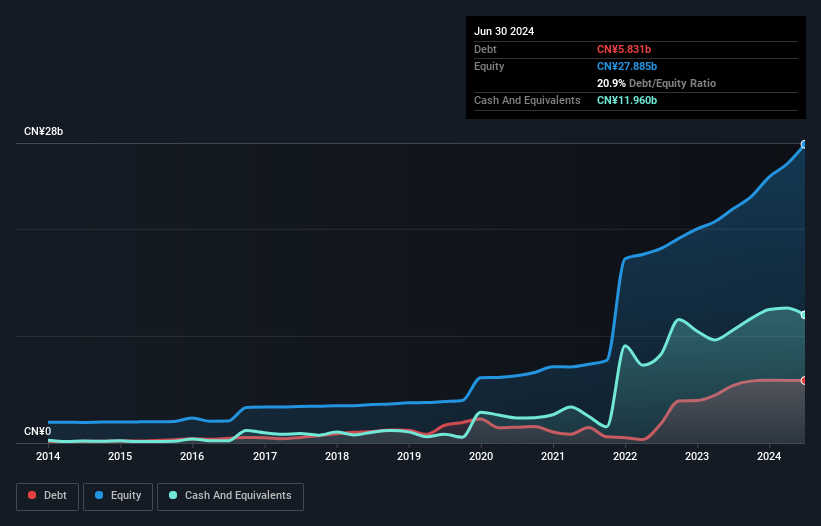Here's Why NAURA Technology Group (SZSE:002371) Can Manage Its Debt Responsibly
Warren Buffett famously said, 'Volatility is far from synonymous with risk.' So it seems the smart money knows that debt - which is usually involved in bankruptcies - is a very important factor, when you assess how risky a company is. We can see that NAURA Technology Group Co., Ltd. (SZSE:002371) does use debt in its business. But should shareholders be worried about its use of debt?
What Risk Does Debt Bring?
Generally speaking, debt only becomes a real problem when a company can't easily pay it off, either by raising capital or with its own cash flow. If things get really bad, the lenders can take control of the business. However, a more common (but still painful) scenario is that it has to raise new equity capital at a low price, thus permanently diluting shareholders. By replacing dilution, though, debt can be an extremely good tool for businesses that need capital to invest in growth at high rates of return. When we examine debt levels, we first consider both cash and debt levels, together.
View our latest analysis for NAURA Technology Group
What Is NAURA Technology Group's Net Debt?
As you can see below, at the end of June 2024, NAURA Technology Group had CN¥5.83b of debt, up from CN¥5.35b a year ago. Click the image for more detail. However, its balance sheet shows it holds CN¥12.0b in cash, so it actually has CN¥6.13b net cash.

How Strong Is NAURA Technology Group's Balance Sheet?
According to the last reported balance sheet, NAURA Technology Group had liabilities of CN¥22.5b due within 12 months, and liabilities of CN¥9.61b due beyond 12 months. On the other hand, it had cash of CN¥12.0b and CN¥7.06b worth of receivables due within a year. So its liabilities outweigh the sum of its cash and (near-term) receivables by CN¥13.1b.
Given NAURA Technology Group has a humongous market capitalization of CN¥199.7b, it's hard to believe these liabilities pose much threat. Having said that, it's clear that we should continue to monitor its balance sheet, lest it change for the worse. While it does have liabilities worth noting, NAURA Technology Group also has more cash than debt, so we're pretty confident it can manage its debt safely.
In addition to that, we're happy to report that NAURA Technology Group has boosted its EBIT by 44%, thus reducing the spectre of future debt repayments. There's no doubt that we learn most about debt from the balance sheet. But it is future earnings, more than anything, that will determine NAURA Technology Group's ability to maintain a healthy balance sheet going forward. So if you want to see what the professionals think, you might find this free report on analyst profit forecasts to be interesting.
Finally, a company can only pay off debt with cold hard cash, not accounting profits. NAURA Technology Group may have net cash on the balance sheet, but it is still interesting to look at how well the business converts its earnings before interest and tax (EBIT) to free cash flow, because that will influence both its need for, and its capacity to manage debt. During the last three years, NAURA Technology Group burned a lot of cash. While that may be a result of expenditure for growth, it does make the debt far more risky.
Summing Up
We could understand if investors are concerned about NAURA Technology Group's liabilities, but we can be reassured by the fact it has has net cash of CN¥6.13b. And we liked the look of last year's 44% year-on-year EBIT growth. So we don't have any problem with NAURA Technology Group's use of debt. The balance sheet is clearly the area to focus on when you are analysing debt. However, not all investment risk resides within the balance sheet - far from it. We've identified 1 warning sign with NAURA Technology Group , and understanding them should be part of your investment process.
Of course, if you're the type of investor who prefers buying stocks without the burden of debt, then don't hesitate to discover our exclusive list of net cash growth stocks, today.
Have feedback on this article? Concerned about the content? Get in touch with us directly. Alternatively, email editorial-team (at) simplywallst.com.
This article by Simply Wall St is general in nature. We provide commentary based on historical data and analyst forecasts only using an unbiased methodology and our articles are not intended to be financial advice. It does not constitute a recommendation to buy or sell any stock, and does not take account of your objectives, or your financial situation. We aim to bring you long-term focused analysis driven by fundamental data. Note that our analysis may not factor in the latest price-sensitive company announcements or qualitative material. Simply Wall St has no position in any stocks mentioned.
 Index Options
Index Options CME Group
CME Group Nasdaq
Nasdaq Cboe
Cboe TradingView
TradingView Wall Street Journal
Wall Street Journal